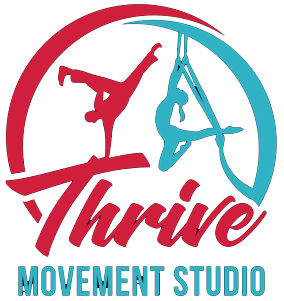 | Thrive Movement Studio |



Thrive Movement Studio is a Harwinton, CT based studio focused on the physical arts of Circus and Aerial Arts
Thrive Movement Studio is a circus and movement based school that opened in the summer of 2014. The studio was a longtime dream of Connecticut based circus artists Heidi Kirchofer and Joel Melendez, who have over 20 years of experience creating and practicing circus, dance and Capoeira. It was designed and built almost completely by the duo and Heidi's father Charles Kirchofer, using local wood milled by Charles and finished with eco-conscious products and materials.Thrive offers quality circus training through safe progressions, accessibility for beginners and all bodies and a solid foundational practice to progress to advanced levels. Classes increase self-confidence, body positivity and awareness while building strength and flexibility. Thrive offers a wide range of classes such as aerial fabric, trapeze, lyra, stilt walking, unicycle, juggling, mini-trampoline, contortion and more. Class offerings are from age 5 - adult. We also have summer camps, intensives workshops and a comprehensive homeschool class




